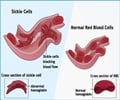Pulmonary hypertension (PH) is a complication of sickle cell disease. A study carried out to evaluate the prevalence of PH in patients with sickle cell disease.

The objective of a study recently published in the New England Journal of Medicine was to evaluate the prevalence of pulmonary hypertension (PH) in adult patients with sickle cell disease (SCD) and confirm it with the help of right heart catheterization. In these patients, SCD was initially suspected on the basis of Doppler echocardiography.
Methods
In this prospective study, 398 outpatients (average age, 34 years) were recruited from referral centers for SCD in France. The study was also carried out in collaboration with the National Reference Center for Pulmonary Hypertension.All patients included in the study were homozygous for hemoglobin S or had Sβ0 thalassemia. Only stable outpatients were included in the study.
Exclusion criteria included –
· Severe renal insufficiency,
· Chronic restrictive lung disease.
Pulmonary hypertension was defined as a mean pulmonary arterial pressure of a minimum of 25 mm Hg.
Follow up was carried on for three years from date of study. Details of death, if any, were carefully documented.
Results & Conclusion
In this study of adult patients with sickle cell disease, the prevalence of a tricuspid regurgitant jet velocity, of at least 2.5 m per second, on echocardiography was 27%. This rate of occurrence was consistent with other studies carried out thus far.In contrast, pulmonary hypertension prevalence that was confirmed on right heart catheterization was only about 6%. Approximately half of these patients, with confirmed PH, had pre-capillary pulmonary hypertension.
Based on their samples, the study concludes that the prevalence of pulmonary hypertension as detected on initial echocardiography screening, and confirmed by right heart catheterization, was 6% and that echocardiography alone was not enough to detect pulmonary hypertension.
Reference:
“A Hemodynamic Study of Pulmonary Hypertension in Sickle Cell Disease” Florence Parent, M.D., Dora Bachir, M.D., Jocelyn Inamo, M.D.,et al., N Engl J Med 2011; 365:44-53
Source-Medindia















